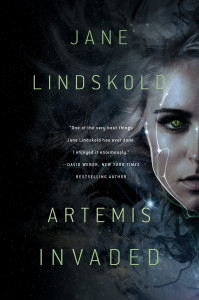 I’m just getting to know Jane Lindskold, because we both have stories in S.M. Stirling’s Emberverse anthology The Change: Tales of Downfall and Rebirth
I’m just getting to know Jane Lindskold, because we both have stories in S.M. Stirling’s Emberverse anthology The Change: Tales of Downfall and Rebirth. And so I’m finding out (because she tells me so, and I believe everything I’m told, and also because it’s true) that she is the award-winning, New York Times bestselling author of something like twenty-five novels and about seventy short stories. Honestly, she keeps losing count.
Jane lives in New Mexico, not with wolves, but with cats and guinea pigs. And a lovely husband.
Since these mini-interviews are all about heroine… heroineism? I asked:
Is there a literary heroine on whom you imprinted as a child? A first love, a person you wanted to become as an adult, a heroic girl or woman you pretended to be on the playground at recess?
This is a really tough question for me, because the answer is “No. There isn’t.”
Certainly female characters existed and I read about them, but I never imprinted on Nancy Drew or wanted to be Trixie Belden or Jo March. I liked Laura Ingalls Wilder’s books, but, again, I didn’t want to be Laura or Mary.
If you narrow the fields to SF/F, there were far fewer major female characters when I was a girl and none of those I encountered became role models for me.
Do goddesses count? I always thought Artemis was very cool… Athene had appeal, too, except when she got stupid over that golden apple.
If I “imprinted” on any fictional character, it was Mowgli from Rudyard Kipling’s The Jungle Book.
What was it about Mowgli?
I think I liked Mowgli because he functioned outside of the social matrix. Early in The Jungle Book, Mowgli leaves the wolf pack to live by his own code. His “brothers” remain close to him and he certainly has friends, but he’s not interested in letting anyone else run his life.
The Artemis I liked was very much in the same mold. My attraction to her had less to do with any particular story/myth than the sense of freedom I got from her. When I was a girl, the three things I wanted most were a canoe, a non-kitchen knife, and a large dog. I never got any of them, though I did have a canoe on loan for a few years.
Of course, both Mowgli and Artemis associated with animals on a more or less equal basis. I have no idea why, but this has always appealed to me.
Would you say, then, that Mowgli and/or Artemis inspired any of the female characters in your work?
There are two who definitely belong to this lineage.
The most obvious would be Firekeeper, the central character in what – despite the formal series title, “The Firekeeper Saga” – everyone just calls “The Wolf Books.” Firekeeper is not Mowgli. For one, she never becomes the Lord of the Jungle, or the ruler of much of anything except her own life.
She cares passionately for those she takes as her own, human or otherwise.
My new “Artemis Awakening” series also owes an obvious debt to this lifelong interest. Adara the Huntress, the main female character, is definitely an “Artemesian” figure. Not a virgin, though, but then neither was Artemis originally…
_____
About this post: The Heroine Question is my name for a series of short interviews with female writers about their favorite characters and literary influences. Last week’s installment, with Martha Wells, was all about Erma Bombeck. Now that we’ve delved into Kipling and the Greek Pantheon, I think we can safely expect this series to cover a wide range of subjects, both real and imaginary!
_____
Jane Lindskold has a web site here and can also be found online on Twitter and Facebook.


